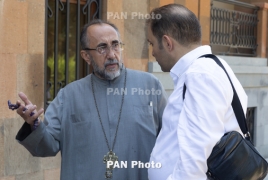
The legal team representing His Eminence Archbishop Mikael Ajapahyan has filed a motion with the prosecutor of the division handling crimes against state authority in the Office of the Prosecutor General of Armenia, seeking to terminate the criminal prosecution against the cleric.
According to the defense, “The motion outlines that the act attributed to the Archbishop does not meet the criteria for a criminal offense and therefore the prosecution should be halted.”
They emphasized that as early as 2008, the Constitutional Court of Armenia clarified what constitutes a “public call for the violent seizure of state power.” Specifically, it stated that such calls must include the intent to usurp governmental functions outside the constitutional framework and actively involve or invite others to participate in this aim.
In the defense's view, based on legal interpretation, criticism of the authorities, calls for resignation, or encouraging rallies or marches do not amount to incitement to violence unless there are clear invitations to commit violent acts addressed to a broad audience. Moreover, the lawyers stressed that the Archbishop's remarks referenced past conversations with specific individuals, not broad public calls at the time of their broadcast.
They cited a February 3, 2024 interview with GALA TV, where Archbishop Mikael said: “This is what it’s come to—this is the respect I’m shown. If anyone actually listened to me, the revolution would have happened long ago.” He later added: “I only know three ways to change power—elections, supposedly; a coup; or a popular uprising. All three are impossible now, subjectively and objectively.” He also stated: “Isn’t it clear from my past six years of work what I’m saying? How many times did I openly say a military coup is necessary? I told this to both presidents—Kocharyan and Sargsyan—during the war.”
The defense underlined that these comments recounted conversations with specific individuals and do not meet constitutional criteria for incitement to violence, as they were neither public nor aimed at mobilizing a broad audience.
The lawyers also argued that in these interviews, the Archbishop did not call upon any unspecified group to carry out violent actions. The phrase “a military coup is necessary” was not presented as a directive or organizational appeal but as part of a reflection with known counterparts—Robert Kocharyan and Serzh Sargsyan.
Prosecutors based the charges on a June 21, 2025 interview in which the Archbishop reaffirmed his earlier statements. However, the defense contends that this interview was a clarification. “I called for a coup—not to seize power—but to save this country from a madman. I told the security forces to act. They didn’t. They’re just as guilty.”
According to the defense, the Archbishop's statements express deep concern over the country’s condition, not a mobilization effort. “I didn’t call for a power grab. I said it had to be done. That’s a necessity, not a call to action,” they argued.
They stressed that the Archbishop’s speech reflected disappointment with political developments, not practical instructions or organized appeals. “It still needs to be done, even if it's too late. But if the security forces are just protecting homes, not the country or its people, let them keep doing that.”
The defense concluded that none of the Archbishop's words fit the constitutional definition of incitement, as there were no direct or indirect calls for organizing a coup or violent acts. They emphasized that such statements must be public, specific, and aimed at mobilizing groups to meet legal thresholds.
Referring to an April 30, 2024 letter to Daniel Ioannisyan, they recalled that Prosecutor Hayk Hovhannisyan acknowledged that Archbishop’s earlier statements—such as “a military coup must happen or Armenia will become Ermenistan”—did not qualify as public calls to seize power, and no criminal proceedings were initiated at the time.
In this context, the defense claimed a violation of the principle prohibiting double jeopardy. They pointed out that the same factual basis had already been legally assessed and deemed non-criminal, and therefore could not be the foundation for renewed prosecution.
They referenced precedent from the Court of Cassation, which states that double prosecution on identical factual grounds is forbidden, regardless of legal classification. According to the defense, the Archbishop’s interviews from 2024 and 2025 repeat the same opinions expressed in 2023.
In conclusion, the defense declared: “We believe there are full legal grounds to immediately drop the criminal prosecution.”
On the morning of June 27, about 30 masked individuals stormed the diocesan office in Shirak. Archbishop Mikael Ajapahyan, however, was at the Mother See of Holy Etchmiadzin for a scheduled clergy assembly. The National Security Service entered the church grounds to arrest him. After a scuffle, he left with the Catholicos. Later, he turned himself in to the Investigative Committee and was detained for two months. Archbishop Ajapahyan was charged under the article for public calls to seize power, violate territorial integrity, renounce sovereignty, or overthrow the constitutional order.

